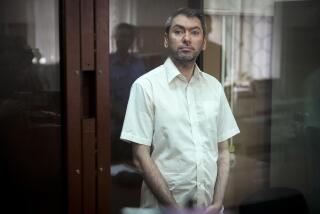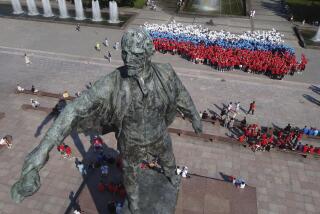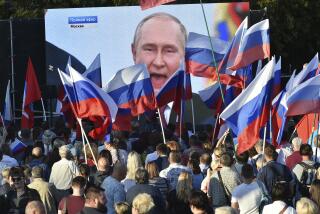Sakharov Urges West to Back Soviet Reforms : Gorbachev Failure Could Bring Crackdown on Rights, Destabilize World, He Declares in U.S.
- Share via
SOMERVILLE, Mass. — Soviet physicist Andrei D. Sakharov, saying that perestroika is not just “theater for the West,” warned here Monday that the failure of the reform movement in the Soviet Union would mean both a human rights crackdown at home and “external expansion” that could destabilize the world.
Using his first public platform in the West to discuss the radical changes under way in his country, the 67-year-old Nobel Peace Prize laureate also complained that a series of new laws backed by Soviet opponents of perestroika-- political and economic restructuring--have created “virtual martial law” and led to “great anxiety” about prospects for democratic evolution.
Do So ‘With Open Eyes’
“The West should be genuinely interested in the success of perestroika and support it,” he said at a press conference here during the first full day of a two-week visit to the United States. But it should do so “with open eyes--not with pressure, not with interference in (Soviet) internal affairs,” he added, “but with sharp interest that perestroika is developing in correct directions.”
Sakharov’s visit here has been eagerly anticipated because of his international stature as an intellectual and his virtual personification of Soviet dissent for almost two decades.
He is scheduled to spend his time in this country visiting relatives, undergoing medical tests and attending a board meeting of the International Foundation for the Survival and Development of Humanity. His trip comes less than two years after he was allowed to return to Moscow from internal exile in the Soviet city of Gorky, where he was sent in 1980 because of his opposition to the Soviet invasion of Afghanistan in December, 1979.
He is traveling without his wife, Yelena Bonner, who remained in Moscow.
On his arrival Sunday night, Sakharov had said that he always had “great respect” for the United States, and on Monday he elaborated on what he admires about this country.
“Democracy,” he said, “her labor structure, the fact that human labor is valued. Her dynamism. Her self-criticism. It is a very rare quality in the world arena. In most countries, public opinion structures support decisions (by the authorities). In the United States, (citizens) take a very self-critical attitude to internal political policies and actions.
“Also, I respect the national character that has developed in this country. . . . ‘Can I help you?’ is a phrase often heard on the streets, in other personal relations. Also on the international stage. I very much respect this country,” he concluded with an almost embarrassed smile.
The Soviet scientist, known as the “father” of the Soviet hydrogen bomb and a dedicated human rights advocate, was granted an unrestricted visa to leave his country for a two-year period while serving on the board of the new international foundation.
Private U.S.-Soviet Group
The private group, which plans an organizational meeting in Washington early next week, was founded by Soviet and American scientists and educators to examine aspects of arms control, the environment, culture and education that are global rather than national in scope. It has received donations from philanthropic groups here and has access to unspent funds donated by Soviet citizens toward recovery from the 1986 Chernobyl nuclear disaster in the Soviet Ukraine.
Yevgeni P. Velikov, chairman of the foundation’s executive committee and a vice president of the Soviet Academy of Sciences, said that one project being considered is the exchange of 2,000 American and Soviet children next year to attend summer camps in the other country.
While addressing a variety of issues in his press conference at the American Academy of Arts and Sciences headquarters in this Boston suburb, Sakharov, speaking through an interpreter, used his most emotional language to endorse perestroika . He pointed out the dangers of its failure for the West and complained that it is in danger of being turned against democratization.
“I think that perestroika is an extraordinarily serious process,” he said. “These are no false goals. These are sincere, true. . . . This is not theater for the West.”
He added: “Perestroika is essentially concerned with the internal problems of our country,” and “the West must not fear its goals. The great danger to the West is failure of perestroika . . . (for that) would mean the simultaneous failure of internal reforms, with the strengthening of repressive organs (like the KGB secret police), and the necessity of external expansion to preserve the (Soviet) system.
“The result would be the loss of stability in all the world, a catastrophe from which would arise a grave threat to all humanity,” he said.
West Should Support Reforms
The West should support Soviet President Mikhail S. Gorbachev’s reform program, keeping its changes “under close observation,” he added. The size and form of Western help must be carefully adapted to what is occurring there.
Sakharov complained bitterly about several new developments, backed by opponents of perestroika, that have limited freedom of association, demonstrations and the press in the Soviet Union.
Permission now must be obtained for meetings, for example, and new authority granted to special police in the Interior Ministry “creates a virtual situation of martial law,” he said. Also, he noted, there is “criminal responsibility” for possessing a photocopying machine or a personal computer with a printer because they could be vehicles for the “uncontrolled distribution of information.”
On other issues, Sakharov said he was correct in 1983 to urge U.S. development of the controversial MX intercontinental missile as leverage to bring the Soviet Union into serious arms reduction negotiations, although he was vilified by the Kremlin at the time for his stand.
At the same time, he also repeated his criticism of the Reagan Administration’s controversial “Star Wars” plan to build a comprehensive space-based missile defense system.
Nuclear Energy Supported
Sakharov said he was “deeply convinced nuclear energy should be developed” for peaceful electrical uses because it would be an economic necessity in the next century.
More to Read
Sign up for Essential California
The most important California stories and recommendations in your inbox every morning.
You may occasionally receive promotional content from the Los Angeles Times.










